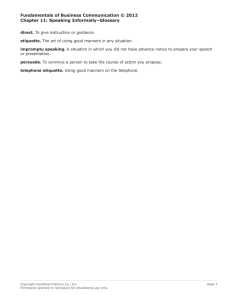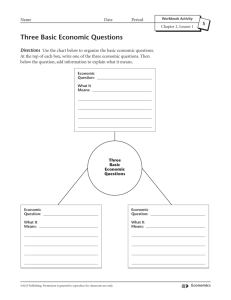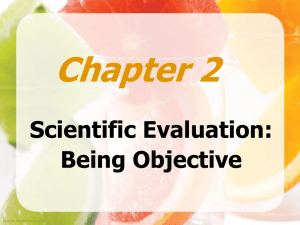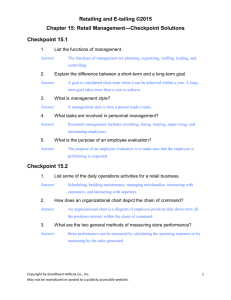Theories of Development
advertisement
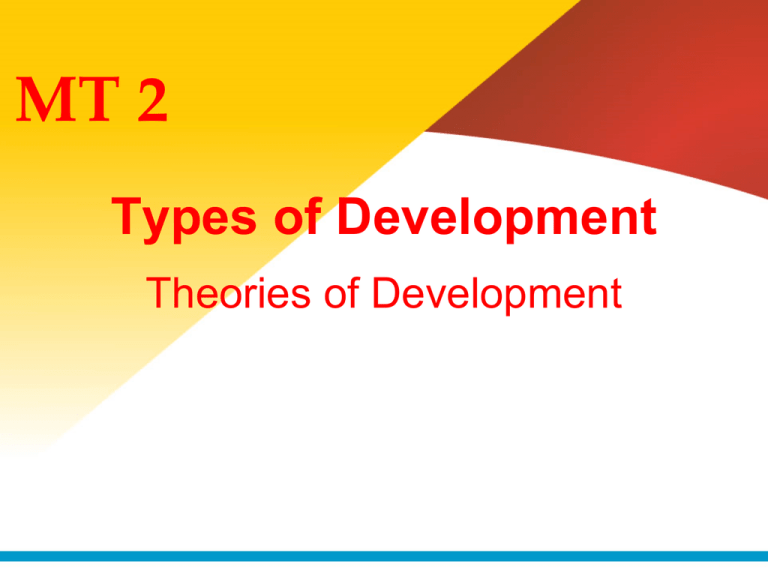
MT 2 Types of Development Theories of Development Objectives • Distinguish between growth and development. • Identify the main types of human development. • Develop examples that illustrate principles of development. • Define a developmental theory. • Apply developmental theories to real-life situations. • Analyze how developmental theories impact teaching. © Monkey Business Images/Shutterstock © Goodheart-Willcox Co., Inc. Permission granted to reproduce for educational use only. Understanding Human Development • Growth refers to physical changes • Stages of development are similar for almost everyone © Goodheart-Willcox Co., Inc. Permission granted to reproduce for educational use only. Physical Development • Physical development includes – gross-motor skills, such as walking and throwing; involves large muscles – fine-motor skills, such as picking up objects and eating with a spoon; involves the use of small muscles © Goodheart-Willcox Co., Inc. Permission granted to reproduce for educational use only. Cognitive Development • Cognition involves – – – – knowing memorizing sensing organizing © StockLite/Shutterstock continued © Goodheart-Willcox Co., Inc. Permission granted to reproduce for educational use only. Cognitive Development • Cognitive development is also called intellectual development • Skills increase gradually over time • Connections between brain nerve cells is key to cognitive development • Brain connections strengthen with experiences starting in infancy © Goodheart-Willcox Co., Inc. Permission granted to reproduce for educational use only. Social-Emotional Development • Social-emotional development includes – – – – relationships feelings social skills self-confidence and self-esteem – self-control continued © Goodheart-Willcox Co., Inc. Permission granted to reproduce for educational use only. Social-Emotional Development • Challenges increase as development progresses © Monkey Business Images/Shutterstock © Goodheart-Willcox Co., Inc. Permission granted to reproduce for educational use only. Principles of Human Development • • • • Development is relatively orderly Developing is a gradual, continual process Development is interrelated Development varies among individuals © Goodheart-Willcox Co., Inc. Permission granted to reproduce for educational use only. Development Is Relatively Orderly • Development occurs in a sequence of steps • Predictable steps consistently follow one after another • Teachers use this knowledge to design appropriate learning strategies for their students’ age © Goodheart-Willcox Co., Inc. Permission granted to reproduce for educational use only. For Discussion • Give examples of how development occurs in predictable steps. © Michael D. Brown/Shutterstock © Goodheart-Willcox Co., Inc. Permission granted to reproduce for educational use only. Development Is a Gradual, Continuous Process • Developmental changes happen gradually • They become apparent over time © Kharidehal Abhirama Ashwin /Shutterstock © Goodheart-Willcox Co., Inc. Permission granted to reproduce for educational use only. Development Is Interrelated • Acquiring new skills requires gains in several areas – – – – Physical development Cognitive development Social development Emotional development © Goodheart-Willcox Co., Inc. Permission granted to reproduce for educational use only. For Reflection • As a teen, in what ways have you developed physically? cognitively? socially? emotionally? © Archipoch/Shutterstock © Goodheart-Willcox Co., Inc. Permission granted to reproduce for educational use only. Development Varies Among Individuals • Many factors affect development • Each person’s progress is unique – Different rates – Slightly different time schedules © Goodheart-Willcox Co., Inc. Permission granted to reproduce for educational use only. Theories of Development continued © Goodheart-Willcox Co., Inc. Permission granted to reproduce for educational use only. Theories of Development • How are developmental theories created? – – – – analyzing behavior and development observing people performing experiments considering earlier research studies continued © Goodheart-Willcox Co., Inc. Permission granted to reproduce for educational use only. Theories of Development • Developmental theories help teachers – understand what students are capable of and why – get a broader picture than limited experiences and observations provide • Many developmental theories exist © Goodheart-Willcox Co., Inc. Permission granted to reproduce for educational use only. Heredity Versus Environment • Nature (heredity) versus nurture (environment) © Felix Mizionikov/Shutterstock © Goodheart-Willcox Co., Inc. continued Permission granted to reproduce for educational use only. Behaviorist Theories • Behaviorism: behavior determined by forces in the environment beyond individuals’ control • People’s thoughts, feeling, and actions depend on experience rather than genetics or free will • Infants are “blank screens” © Goodheart-Willcox Co., Inc. Permission granted to reproduce for educational use only. Pavlov’s Classical Conditioning • Classical conditioning—behaviors are associated with responses – Pavlov rang bell when feeding dog – Eventually when Pavlov rang bell, dog salivated even if no food was given • Classical conditioning may occur without training © Goodheart-Willcox Co., Inc. Permission granted to reproduce for educational use only. Skinner’s Operant Conditioning • Operant conditioning—people repeat behaviors that have positive results • Reinforcement should be removed gradually in unpredictable patterns • Negative reinforcement (punishment) reduces unwanted behaviors © Goodheart-Willcox Co., Inc. Permission granted to reproduce for educational use only. Bandura’s Social Cognitive Theory • People of all ages observe and imitate others’ behavior • Reactions to rewards and punishments are filtered by perceptions, thoughts, and motivation • Each person’s response is based on personal reactions and the way the individual processes information © Lobke Peers/Shutterstock © Goodheart-Willcox Co., Inc. continued Permission granted to reproduce for educational use only. Piaget’s Cognitive Theory • Four stages of cognitive development • At each stage, individuals incorporate what they learn into skills developed in previous stages • Children base their thinking on what they learn through their senses continued © Goodheart-Willcox Co., Inc. Permission granted to reproduce for educational use only. Vygotsky’s Sociocultural Theory • Children are social beings • Develop through interactions with parents, teachers, other students • Social interaction is critical to cognitive development © Goodheart-Willcox Co., Inc. Permission granted to reproduce for educational use only. Erikson’s Psychosocial Theory • Eight stages • At each stage, people face and must successfully resolve a psychological or social conflict • Unsuccessful resolution affects future stages of development continued © Goodheart-Willcox Co., Inc. Permission granted to reproduce for educational use only. For Reflection • Which of Erikson’s stages have you already successfully completed? How do you know? © Archipoch/Shutterstock © Goodheart-Willcox Co., Inc. Permission granted to reproduce for educational use only. Kohlberg’s Theory of Moral Development • Everyone follows the same progression • Not everyone attains the highest level • Preconventional morality—depends on whether behavior will be punished or rewarded • Conventional morality—motivated by society’s laws and rules • Postconventional morality— decisions based on principles and motivated by integrity © iQoncept/Shutterstock continued © Goodheart-Willcox Co., Inc. Permission granted to reproduce for educational use only. Which Theory Is Correct? • Each theory is valid to some extent • Some theories may be more sound than others • Conflict between theories leads to more valid insights • Teachers can benefit from understanding several approaches and applying them in the classroom © Goodheart-Willcox Co., Inc. Permission granted to reproduce for educational use only. For Discussion • Which theory discussed do you think would be most valuable to you as a teacher? Why? © Michael D. Brown/Shutterstock © Goodheart-Willcox Co., Inc. Permission granted to reproduce for educational use only. Key Points • Principles of development help in understanding how people change throughout life • Researchers form developmental theories based on their observations and experiments • Teachers use these theories to help promote their students’ development © Goodheart-Willcox Co., Inc. Permission granted to reproduce for educational use only. Review • ____-____ skills depend on the development of small muscles. Fine-motor • Name four basic principles of human development. Development is relatively orderly; is a gradual, continual process; is interrelated; varies among individuals continued © Goodheart-Willcox Co., Inc. Permission granted to reproduce for educational use only. Review • Which behaviorist developed a theory of operant conditioning? B.F. Skinner • What are the four stages of Piaget’s cognitive theory? sensorimotor, preoperational, concrete operational, formal operational © Goodheart-Willcox Co., Inc. Permission granted to reproduce for educational use only.
